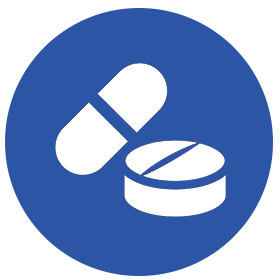Medications
 It is important to know what medications you take and why. Keep a current list of what you take with you at all times.
It is important to know what medications you take and why. Keep a current list of what you take with you at all times.
What should you do when you meet your doctor, nurse or pharmacist?
- List how much and how often your take your medications
- Speak with your doctor, nurse or pharmacist about any over-the-counter medications (for example, non-prescription medications), vitamins, herbal medications you are taking, including cannabis or marijuana
- Speak with your doctor before you or your family members get any shots (such as flu shots, childhood vaccines)
- Speak with your doctor or pharmacist before you refill medications
- Let your health care team know if you need help paying for prescriptions
- Speak with your hospital pharmacist if you would like help updating your medication list or if you would like a schedule that might include your new chemotherapy medications
How should you store your medications at home?
- Take all of your medications as prescribed and at the same time every day for the number of days ordered by your doctor
- Consider using a pill box or blister pack to organize your medications. You can speak to your hospital or community pharmacist about how to set this up
- Put your medications in a dry and cool place, but not in the bathroom or fridge unless told to do so by your doctor or pharmacist
- Store your medications out of the reach of young children
How should you take medications at home?
- Do not drink alcohol, grapefruit or pomegranate juice with medications. Speak to your health care team if you have questions or concerns about this
- Avoid taking pain medication that may raise your risk of bleeding (for example: Aspirin, Advil, Aleve, Ibuprofen, Naproxen)
- Do not take Tylenol (acetaminophen) before taking your temperature. This medication may hide a fever.
- Try to use the same pharmacy to fill prescriptions so that medications can be tracked
- Do not take medications that are not prescribed for you






